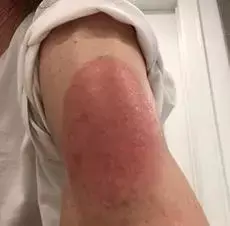- Home
- Medical news & Guidelines
- Anesthesiology
- Cardiology and CTVS
- Critical Care
- Dentistry
- Dermatology
- Diabetes and Endocrinology
- ENT
- Gastroenterology
- Medicine
- Nephrology
- Neurology
- Obstretics-Gynaecology
- Oncology
- Ophthalmology
- Orthopaedics
- Pediatrics-Neonatology
- Psychiatry
- Pulmonology
- Radiology
- Surgery
- Urology
- Laboratory Medicine
- Diet
- Nursing
- Paramedical
- Physiotherapy
- Health news
- Fact Check
- Bone Health Fact Check
- Brain Health Fact Check
- Cancer Related Fact Check
- Child Care Fact Check
- Dental and oral health fact check
- Diabetes and metabolic health fact check
- Diet and Nutrition Fact Check
- Eye and ENT Care Fact Check
- Fitness fact check
- Gut health fact check
- Heart health fact check
- Kidney health fact check
- Medical education fact check
- Men's health fact check
- Respiratory fact check
- Skin and hair care fact check
- Vaccine and Immunization fact check
- Women's health fact check
- AYUSH
- State News
- Andaman and Nicobar Islands
- Andhra Pradesh
- Arunachal Pradesh
- Assam
- Bihar
- Chandigarh
- Chattisgarh
- Dadra and Nagar Haveli
- Daman and Diu
- Delhi
- Goa
- Gujarat
- Haryana
- Himachal Pradesh
- Jammu & Kashmir
- Jharkhand
- Karnataka
- Kerala
- Ladakh
- Lakshadweep
- Madhya Pradesh
- Maharashtra
- Manipur
- Meghalaya
- Mizoram
- Nagaland
- Odisha
- Puducherry
- Punjab
- Rajasthan
- Sikkim
- Tamil Nadu
- Telangana
- Tripura
- Uttar Pradesh
- Uttrakhand
- West Bengal
- Medical Education
- Industry
Azathioprine may increase risk of cutaneous squamous cell carcinomas in solid organ transplant recipients

CAPTION
In correspondence published in The New England Journal of Medicine, researchers from Massachusetts General Hospital note that Phase 3 clinical data from the Moderna vaccine trial did show delayed skin hypersensitivity in a small number of the more than 30,000 trial participants. However, the authors say the large, red, sometimes raised, itchy or painful skin reactions were never fully characterized or explained, and they warn clinicians may not be prepared to recognize them and guide patients on treatment options and completion of the second dose of the vaccine.
CREDIT
Massachusetts General Hospital
Jennifer R Dusendang and colleagues conducted a new study and discovered that the knowledge of risks and benefits in a wide range of patients can lead to improvements in care. The risk of cutaneous squamous cell carcinoma (cSCC) in solid organ transplant recipients (SOTRs) using modern immunosuppressive regimens must be understood. There is a scarcity of proper knowledge and guide for physicians in the prevention of cutaneous squamous cell carcinoma in solid organ transplant recipients, which can really be a major downside in the medical front.
Keeping the above information in mind researchers conducted this study with the objective to assess the risk of cSCC in relation to SOTR medications. The findings of this study were published in Journal of the American Academy of Dermatology.
From 2009 to 2019, 3308 SOTRs and 65,883 non-transplant recipients were included in this cohort and nest case-control study. Pathology data identified the incident cSCC, and pharmacy data identified the medications. Cox proportional hazards analysis was used to calculate adjusted hazard ratios and 95 percent confidence intervals (CIs), with voriconazole being studied as a time-dependent variable.
The findings of this study were as follows:
1. The annual incidence of cSCC was 1.69 percent in SOTRs and 0.30 percent in non-transplant recipients.
2. The adjusted hazard ratio for cSCC associated with lung transplant was 14.83 (95% CI, 9.85-22.33) for the lung and 6.53-10.69 for other organs.
3. Latinx people were at a higher risk than other non-White groups. The hazard ratio for each month of voriconazole use was 1.14 among lung recipients (95 percent CI, 1.04-1.26).
4. Azathioprine use for 7 months due to mycophenolate mofetil intolerance was linked to a 4.22-fold increased risk of cSCC (95 percent CI, 1.90-9.40).
5. Belatacept and other immunosuppressive medications were not linked to an increased risk.
In conclusion, the Authors added that Azathioprine has been linked to an increased incidence of cutaneous squamous cell carcinomas in solid organ transplant recipients, and it should be used with caution.
Reference:
Dusendang JR, Carlson E, Lee DS, Marwaha S, Madani S, Alexeeff SE, Webber A, Goes NB, Herrinton LJ. Cohort and nested case-control study of cutaneous squamous cell carcinoma in solid organ transplant recipients, by medication. J Am Acad Dermatol. 2021 Aug 9:S0190-9622(21)02275-1. doi: 10.1016/j.jaad.2021.07.065. Epub ahead of print. PMID: 34384835.
Medical Dialogues consists of a team of passionate medical/scientific writers, led by doctors and healthcare researchers. Our team efforts to bring you updated and timely news about the important happenings of the medical and healthcare sector. Our editorial team can be reached at editorial@medicaldialogues.in.
Dr Kamal Kant Kohli-MBBS, DTCD- a chest specialist with more than 30 years of practice and a flair for writing clinical articles, Dr Kamal Kant Kohli joined Medical Dialogues as a Chief Editor of Medical News. Besides writing articles, as an editor, he proofreads and verifies all the medical content published on Medical Dialogues including those coming from journals, studies,medical conferences,guidelines etc. Email: drkohli@medicaldialogues.in. Contact no. 011-43720751


